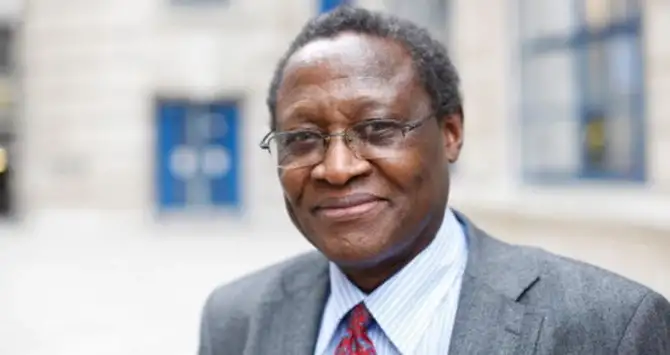
I first heard Thandika Mkandawire’s name from my friend Vivian, a fireball Tanzanian woman that shows more daring everyday than I could probably muster in a lifetime. So, we are a group of African students, meeting for the first time in the Post-graduate Student Lounge, all studying International Development at the London School of Economics. This is at the time when, fresh from our various African countries, we are earnestly plotting the charts that will guide us through our year at LSE, with academic modules as reference points. There is undeniable excitement in the air, and we are expectant. I am here for Africa, I remember saying, so I will take all the “Africa’’ courses. The Africa courses I am referring to are African Political Economy, African Development and a bonus Poverty module — of course. Eiii, I am not doing any of those courses, I remember Vivian saying, but Thandika Mkandawire will teach the African Development module and I think you will like him.
The second time I hear his name, we are in a similar group of African students. We are now halfway into the semester and have lost most of our initial exuberance. We are sitting just outside the lecture theatre after an “Africa” class and are speaking about our experiences with our studies thus far. The mood is sombre. Thandika Mkandawire will be the best person to talk to about these issues, someone tells us. Thandika. We are informed that the issues we are currently facing as Africans studying development are battles that Thandika himself has fought. One of such fights, apparently, included Thandika firmly rejecting a proposal to reduce the entry requirements for Africans to get into LSE. They tried to do what?! We are appalled. It is hard enough trying to navigate our academics with our heads held high. We can’t imagine what it would be like if people assumed we were only offered places because we are from poor countries. Why isn’t he here? I ask. He has been unwell, comes the response, but he should be back on campus to teach next term. He never came back.
I learned of Thandika’s death on a WhatsApp group for the LSE Africa/Caribbean Society. Thandika Mkandawire is dead, someone had posted. My first reaction was ???? Prof. Mkandawire had died?! Yes, it’s on Twitter. Thandika was dead. It took a while for the reality to sink in.
That night I bury myself in unending videos of him being alive. I start with the recording of his inaugural speech, after he was appointed the Head of the LSE Africa Initiative in 2010. The first thing I observe is the humility with which he carries himself. The second thing, his passion. More specifically, for African knowledge production. “If we bring back development, we have to bring back the question of knowledge at the heart of the development process.” He shares his vision for the Africa Initiative — partnership with African universities to improve the capacity of their faculties. His opinion about Africa Centres, that they are mostly for helping Europe understand Africa, is amusing to me. He makes a joke, saying, “Most Africans who come to Europe to study don’t study Africa eh?” Haha.
A few more videos and a couple of other statements stir me. “African states have never been able to develop an organic link with their intelligentsia”. My former boss used to say something similar. He used to say that the failure of African development was a failure of the African intelligentsia. I was never sure exactly what he meant, but what I know is that Thandika’s death is a terrible blow to an already feeble body of knowledge producing Africans that have made developing their continent their life’s work. “Nobody takes African thinking seriously.” An unfortunate reality that is still applicable today. “You can say crap [about] Africa and you know there will be no response.” His words. “I have taken it upon myself that as long as I live, I will review what has been written about Africa and respond.” Sigh.
I mourn Prof. Mkandawire the way a child would mourn a mother that died before they gained the ability to remember. He is the Teacher and Mentor that I never had but at the same time I can feel his influence on my work. I continue to learn from him, even in death. Even simple things, like his acceptance of Africanists, versus my latent suspicion. “I am very interested in the development of nations. I am African so I don’t have a choice.” It is interesting to hear him say this. It is something I have said myself, on several occasions. I guess I was his student, even before I realised it, and even though we never crossed paths at the London School of Economics.
The LSE has lost a treasure and a great torchbearer as it continues to grapple with figuring out Africa’s place in its intellectual pursuits. More than a decade ago an article in its student paper, the Beaver, asked, Where is Africa in the curriculum? Ten years later, there is still a struggle to decolonise the curriculum. One thing is for certain, I am not only learning to understand the causes of things. Instead, like many Africans that have come before me, I am learning to question everything. I am learning the art of persistent contestation, as I refuse to get comfortable in the hole that the world has carved out for me, as an African.
Thandika’s passing is surrounded by very unfortunate circumstances. We have a pandemic on the loose disrupting the fabric of our world as we know it. More than a hundred thousand people have died, and a long-standing debate about exactly what value to assign to human life in the equation of economic growth and development is coming to a feverish crescendo.
Governments and health systems around the world are being put through the test of fire, and many of them are failing, with their citizens paying the ultimate price. The talking heads, initially surprised that the African continent seemed to be mostly left out of the disease caused carnage, are now looking expectantly towards the continent and getting ready to report what they expect will be a humanitarian disaster of enormous proportions. This is a critical juncture for the global economy, and African thinkers that can form independent opinions are needed more than ever.
What is our vision for our society? We have an opportunity to shape a world that is different. A third world, in its original sense. A world that will include everyone, with people at the centre rather than just the economic unit. Social policy, at the heart of development policy is how Thandika described it. This is what he wanted. It is what he preached. I think he would have been deeply intrigued by the ongoing political experiment in Africa, with many governments cautiously trying on the aprons of welfarism as a result of the pandemic.
Pursuing African development as the development of people, and not just of economies. This is what Thandika has taught us, and this is how we will honour his memory. A great man has fallen from our ranks, but now is the time to regroup. We need all hands on deck, now, more than ever.


